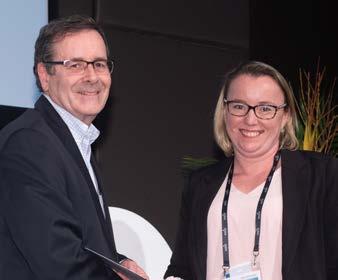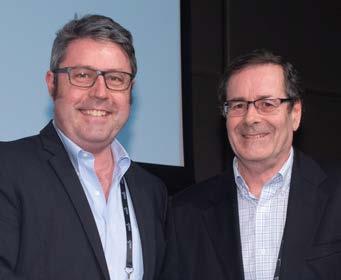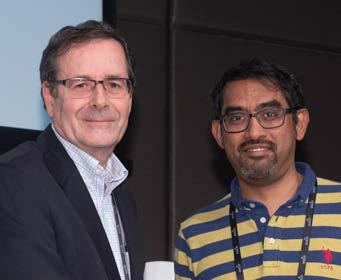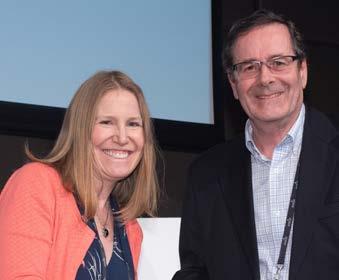
5 minute read
Below the Belt Research Fund
Every cent we raise through the Below the Belt Pedalthon goes directly towards clinical trial research via the Below the Belt Research Fund .
In 2019, ANZUP’s Below the Belt Research Fund provided much needed seed funding to support six ANZUP members to progress new trial ideas to the point of becoming full scale studies . These research grants were announced at the 2019 ASM in Brisbane .
Andrew Moe: SUBDUE
Our research group is aiming to create a new treatment for patients with bladder cancer .
Durvalumab is a medicine that targets the body’s immune cells to help combat bladder cancer . When given intra-venously, durvalumab has proven effective at slowing advanced bladder cancer that has spread to other organs .
We hope that this treatment can be used in a larger trial, and long-term could become a standard treatment for high-risk bladder cancer .

ANDREW MOE RECEIVING HIS AWARD FROM GUY TONER BEN TRAN RECEIVING HIS AWARD FROM GUY TONER

Ben Tran: CLIMATE
Assessing the Clinical utility of miR371 as a marker of residual disease in Clinical Stage 1 Testicular Germ Cell Tumour, following orchidectomy . Testicular germ cell tumours (TGCT) are highly curable, even in the metastatic setting where platinumbased chemotherapy is highly effective . Patients diagnosed with clinical stage 1 (CS1) disease are most likely cured following orchidectomy, however, up to 50% do develop recurrence and require intensive courses of curative chemotherapy . A short, less toxic course of adjuvant chemotherapy can be used to reduce the risk of recurrence, but at a significant risk of over treating the large group of patients who will never recur .
CLIMATE is an innovative registry-based translational clinical trial in TGCT that will generate preliminary data demonstrating the clinical utility of miR-371 in CS1 disease . CLIMATE will enrol CS1 patients recommended for active surveillance, test for miR-371 at predefined timepoints and correlate these findings with recurrence, leveraging prospectively collected clinical data within iTestis, a national testicular cancer registry .
Carole Harris: Using PBS data to understand pattern of care and survival in Australian patients treated for metastatic clear cell kidney cancer
Our study will describe how medications are used across Australia to treat advanced kidney cancer: which drugs, in which order and for how long . We will understand how long people live with these therapies and if there are sequences of treatment that appear to work better . This study has the advantage that it can look at how cancer therapies are used and how effective they are at a population level .
Our future aim will be to use this “linkage data” method as the backbone of real-world clinical trials, where ANZUP members in every hospital in Australia can take part, not just those of us lucky to be in hospitals with many research resources . Real world clinical trials make small changes in the way we use standard treatments, and can have big impacts to improve patients’ outcomes .
CAROLE HARRIS RECEIVING HER AWARD FROM GUY TONER

CRAIG GEDYE RECEIVING HIS AWARD FROM GUY TONER

Craig Gedye: AdapTax
Feasibility, acceptability and safety of adaptively dosed docetaxel in men with metastatic castrate-resistant prostate cancer .
When prostate cancer spreads, injections that suppress the male hormone testosterone can control the cancer for some time, but it almost always starts to grow again later .
These vulnerable and resistant cells of the cancer are often holding each other in balance; and when a treatment is used it can favour one group of cancer cells over another . This trial is designed to test the idea of taking a standard chemotherapy called docetaxel, and if it works to take breaks off the chemo, using it for long enough to control the cancer, but then stopping and saving it up until later to treat the cancer again (and again… and hopefully again, and again) . While every man’s cancer is predicted to eventually become resistant to the chemo treatment, using an effective treatment more sparingly is hoped to spread the benefit over a longer period of time, without any more side-effects .

Kate Mahon: mGSTP1
A randomised trial of biomarker-driven intermittent docetaxel versus standardof-care (SOC) docetaxel in metastatic castration-resistant prostate cancer (mCRPC) .
In Australia last year, over 3,000 men died from prostate cancer and many more are living with this disease . Chemotherapy in the setting of prostate cancer which has spread to other parts of the body improves symptoms and survival, however, chemotherapy is associated with significant side effects.
The standard way to deliver chemotherapy is to continue on a 3 weekly schedule while the cancer is still responding but this is often limited by an accumulation of side effects . Several small studies have suggested that some patients can safely have breaks in chemotherapy with less side effects and a better quality of life .
However, this is difficult to achieve with our current monitoring strategies . We have developed a new blood test which can accurately identify patients who are responding to chemotherapy . We plan to use this blood test to guide breaks in chemotherapy to provide more tolerable treatment and ultimately improve patients’ quality of life .
SHOMIK SENGUPTA RECEIVING HIS AWARD FROM GUY TONER
Shomik Sengupta:
Genomic & immunological predictors of response to intravesical therapy
Many bladder cancers are treated with medications put into the bladder in order to prevent the cancers from growing further into the bladder wall . In some cases, these treatments do not work as they are meant to . At present, we do not know when the treatments might fail . The aim of this study is to assess bladder cancer samples to identify changes within them that may predict whether the commonly used treatments will work or not .
KATE MAHON RECEIVING HER AWARD FROM GUY TONER








